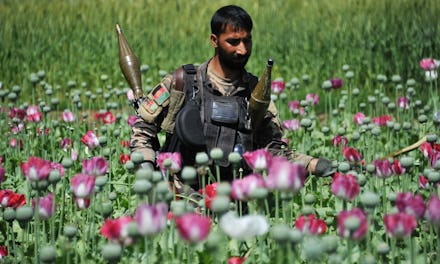This Map Makes It Official: We've Lost This War on Drugs

We've seen plenty of reports about the war on drugs stateside, but it turns out the U.S. was waging a similar war abroad, and the results haven't been any better.
A new report from the Office of the Special Inspector General for Afghanistan Reconstruction says that the country's opium poppy crop, which can be turned into heroin, is at a record high, while cultivation has nearly tripled over the past 20 years.
What makes that trend especially embarrassing for America is that the military has been trying its best to cut down opium production. The United States has actually spent about $7.6 billion to fight cultivation, only to see it get more and more prevalent.
The numbers: Opium was a $3 billion industry in Afghanistan in 2013, according to the report. That's up from $2 billion in 2012, making for a ludicrous one-year increase of 50%.
Poppy farmers grew their crop across 209,000 hectares (about 800 square miles) in 2013, and the report says to expect even more this year. The previous high was 193,000 hectares back in 2007.
"Affordable deep-well technology has turned 200,000 hectares of desert in southwestern Afghanistan into arable land over the past decade," the report says. "Due to relatively high opium prices and the rise of an inexpensive, skilled and mobile labor force, much of this newly arable land is dedicated to opium cultivation. Poppy-growing provinces that were once declared 'poppy-free' have seen a resurgence in cultivation."
Why we can't win: As the report notes, American efforts are not entirely useless. "In past years, surges in opium poppy cultivation have been met by a coordinated response from the U.S. government and coalition partners, which has led to a temporary decline in levels of opium production," it says.
But the decline is always temporary, because we don't have the resources or the ability to stamp out poppy farming for good. So once the U.S. eases off, the crops come back, often stronger than they were before. That "calls into question the long-term effectiveness and sustainability of those prior efforts," according to the report.
There's also the question of whose job it is to keep the drug trade down. The Department of Defense reacted to the report by pointing the finger back at Afghanistan's policymakers. "The failure to reduce poppy cultivation and increase eradication is due to the lack of Afghan government support for the effort," Assistant Secretary of Defense Michael D. Lumpkin wrote. "Poverty, corruption, the terrorism nexus to the narcotics trade and access to alternative livelihood opportunities that provide an equal or greater profit than poppy cultivation are all contributors to the Afghan drug problem."
So while we continue to worry about the war on drugs in America, the greater problem might exist on an actual battlefield, and may just be one we can't win.